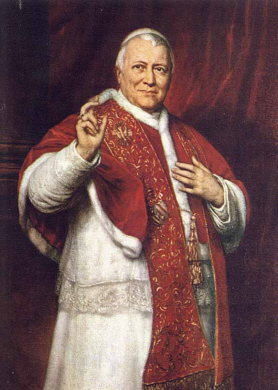Difference between revisions of "Template:Featuredcontent"
Jump to navigation
Jump to search

Graham grove (talk | contribs) |
Graham grove (talk | contribs) |
||
| Line 1: | Line 1: | ||
| + | [[Image:Pius ix.jpg|thumb|[[Pius IX]], instigator of the council which affirmed his absolute authority within the [[Roman Catholic Church]].]] | ||
The '''[[First Vatican Council]]''' (or Vatican I) was a council of the Roman Catholic Church that was summoned by Pope [[Pius IX]]. The first session was held in [[St Peter's Basilica]] on December 8, 1869. It was the 20th ecumenical council of the Roman Catholic Church. Nearly 800 church leaders attended. The pope's two primary purposes were to define the dogma of [[Papal Infallibility]] and to obtain confirmation of the position he had taken in his Syllabus of Errors (1864), condemning a wide range of positions associated with rationalism, liberalism, and materialism... ([[First Vatican Council|Read more]]) | The '''[[First Vatican Council]]''' (or Vatican I) was a council of the Roman Catholic Church that was summoned by Pope [[Pius IX]]. The first session was held in [[St Peter's Basilica]] on December 8, 1869. It was the 20th ecumenical council of the Roman Catholic Church. Nearly 800 church leaders attended. The pope's two primary purposes were to define the dogma of [[Papal Infallibility]] and to obtain confirmation of the position he had taken in his Syllabus of Errors (1864), condemning a wide range of positions associated with rationalism, liberalism, and materialism... ([[First Vatican Council|Read more]]) | ||
{{rightbox | text=[[Archives of Featured Content]]}} | {{rightbox | text=[[Archives of Featured Content]]}} | ||
Revision as of 06:32, 14 August 2007

Pius IX, instigator of the council which affirmed his absolute authority within the Roman Catholic Church.
The First Vatican Council (or Vatican I) was a council of the Roman Catholic Church that was summoned by Pope Pius IX. The first session was held in St Peter's Basilica on December 8, 1869. It was the 20th ecumenical council of the Roman Catholic Church. Nearly 800 church leaders attended. The pope's two primary purposes were to define the dogma of Papal Infallibility and to obtain confirmation of the position he had taken in his Syllabus of Errors (1864), condemning a wide range of positions associated with rationalism, liberalism, and materialism... (Read more)
| Archives of Featured Content |